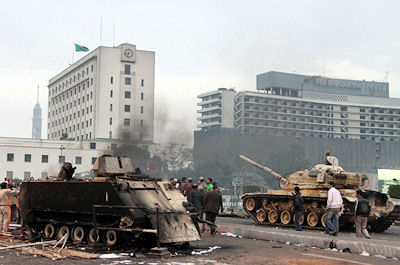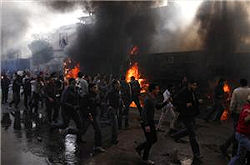 |
| Anti-government protesters continue to demand for an end to Mubarak's 30-year rule [Reuters] |
A tense calm has descended on the Egyptian capital, Cairo, following a night of deadly protests, but anger against Hosni Mubarak's 30-year-old presidency is continuing to simmer.
Al Jazeera's Jane Dutton, reporting from Cairo, said the normally bustling city looked more like a warzone on Saturday morning.
Cities across Egypt witnessed unprecedented protests on Friday, with tens of thousands of protesters taking to the streets after noon prayers to vent their anger against Mubarak. The president went on air at midnight, announcing that he was dismissing his government. His concession, however, did little to douse public anger.
Dutton said the number of the people on the streets "increased after president Hosni Mubarak's speech shortly after midnight".Regarding the situation in Cairo on Saturday morning, she said "there is broken glass everywhere ... a lot of the burnt out shells of the police cars have been removed but you are aware that there were hours and hours of skirmishes on the streets of the capital city [last night]".
Military vehicles have been seen patrolling the streets of the capital.
The ruling National Democratic Party's headquarters in the capital is still ablaze, more than 12 hours after it was set alight by protesters.
The Egyptian army says that it has been able to secure the neighbouring museum of antiquities from the threat of fire and looting, averting the possible loss of thousands of priceless artefacts.
Armoured personnel carriers remain stationed around the British and US embassies, as well as at the state television station.
"The internet remains down, there is still no mobile phone network coverage, and there's very limited landline usage," Dutton said, adding that this made it difficult to contact political activists or those who have been active in the protests.
Authorities had blocked internet, mobile phone and SMS services on Thursday in order to disrupt planned demonstrations.
Al Jazeera's Jamal ElShayyal in Suez reported that the situation in the port city was similar to that in Cairo, with no fresh protests reported early on Saturday morning.
Overnight protests
At least 20 people died and more than 1,000 were wounded in Friday's violent protests in the cities of Cairo, Alexandria and Suez.
Al Jazeera's Ayman Mohyeldin, reporting from Cairo, said protesters had been "galvanised" by Mubarak's announcement that he was staying in power."The streets are definitely still abuzz," he said at 4am local time. "The chants have died down in the last hours but there are still many people out and about in the street despite the fact that there is a curfew supposed to have been imposed, starting from 6pm to 7am.
"The protests and the clashes with police have completely died down as a result of the fact that the police have melted away and the military has taken over."
Military armoured vehicles rolled onto the streets of the capital on Friday night in a bid to quell the protests. People cheered as the army arrived, and hundreds of people thronged around a military vehicle near Cairo's Tahrir square.
"The army is a respected establishment in Egypt, and many feel they need their support against what they see as excessive force by the police and security forces," our correspondent said.
Protesters killed
Friday's demonstrations involving tens of thousands of people were the biggest and bloodiest in four consecutive days of protests against Mubarak's government.
Buildings were set alight, and violent clashes continued into the night after a day of unprecedented anger.
Shots were heard near parliament earlier in the day as the headquarters of the ruling party were in flames.
Dozens of protesters climbed on the military vehicles in Suez. They talked to soldiers who attempted to wave them off.
Protesters often quickly dispersed and regrouped.
As clashes intensified, police waded into the crowds with batons and fired volleys of tear gas.
Mohamed ElBaradei, the former head of the United Nations' nuclear watchdog and an opposition leader in Egypt, was briefly detained by police after he prayed at a mosque in the Giza area but he later took part in a march with supporters.
The unrest in Egypt was triggered by the overthrow two weeks ago of Tunisian president Zine El Abidine Ben Ali in an uprising that has also inspired anti-government protests in Jordan, Yemen and elsewhere.
The government in Egypt had vowed to crack down on demonstrations and arrest those participating in them.
 |
| Fresh protests erupt in Egypt. Army reportedly on the streets of Cairo as curfew is imposed from 6pm to 7am local time - 28-Jan-2011 |
For Fresh protests erupt in Egypt